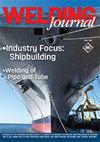Underwater Pulse-Current FCAW - Part 2: Bubble Behaviors and Waveform Optimization
IF 1.4
3区 材料科学
Q2 METALLURGY & METALLURGICAL ENGINEERING
引用次数: 7
Abstract
Underwater pulse-current wet welding was proposed in part 1 of this two-part report. The novel technology obtained improved metal transfer and welding process stability. The main reason for droplet oversizing and long transfer cycles was found to be the deviated large droplet stage. In this part, the waveform optimization for both bubble behaviors and metal transfer were investigated. Efforts were made for shortening the duration of the deviated large droplet stage. Pulse current influences on bubble evolution was studied. It was found that two different separation modes can be adjusted by appropriately changing the current values when the bubbles are necking. Quickly reducing the welding current can sharply lower the impact force on the droplets due to intense gas flow changes inside. Under the optimized pulse current, the range of the metal transfer cycle became narrower, and droplet diameters were smaller than that of the original condition. Stable and improved metal transfer processes were achieved with a frequency of 7.52 Hz and an average droplet diameter of 2.4 mm, which was about 1.5 times the wire diameter. The optimized pulse waveform greatly improved weld formation with less spatter and a more uniform appearance.水下脉冲电流FCAW -第2部分:气泡行为和波形优化
水下脉冲电流湿式焊接在本报告的第1部分中被提出。新工艺提高了金属转移和焊接过程的稳定性。大液滴阶段的偏离是造成液滴体积过大、传递周期过长的主要原因。在这一部分中,研究了气泡行为和金属转移的波形优化。为缩短偏移大液滴阶段持续时间作出了努力。研究了脉冲电流对气泡演化的影响。研究发现,在气泡缩颈时,通过适当改变电流值,可以调节两种不同的分离模式。迅速减小焊接电流,可大幅降低由于内部气流变化剧烈而对熔滴产生的冲击力。优化后的脉冲电流下,金属转移周期范围变窄,液滴直径也比初始条件下小。在频率为7.52 Hz,平均液滴直径为2.4 mm(约为线材直径的1.5倍)时,实现了稳定和改进的金属转移过程。优化后的脉冲波形大大改善了焊缝成形,减少了飞溅,外观更加均匀。
本文章由计算机程序翻译,如有差异,请以英文原文为准。
求助全文
约1分钟内获得全文
求助全文
来源期刊

Welding Journal
工程技术-冶金工程
CiteScore
3.00
自引率
0.00%
发文量
23
审稿时长
3 months
期刊介绍:
The Welding Journal has been published continually since 1922 — an unmatched link to all issues and advancements concerning metal fabrication and construction.
Each month the Welding Journal delivers news of the welding and metal fabricating industry. Stay informed on the latest products, trends, technology and events via in-depth articles, full-color photos and illustrations, and timely, cost-saving advice. Also featured are articles and supplements on related activities, such as testing and inspection, maintenance and repair, design, training, personal safety, and brazing and soldering.
 求助内容:
求助内容: 应助结果提醒方式:
应助结果提醒方式:


